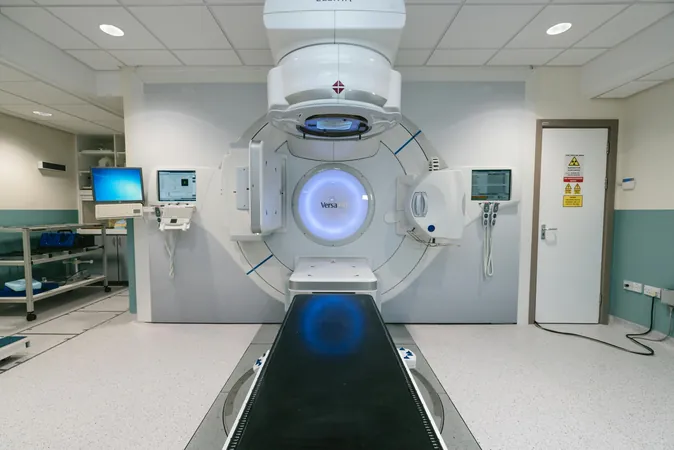
Swedish Scientists Unveil Game-Changing Advances in Radiotherapy: Are We on the Brink of a Cancer Revolution?
2025-01-15
Author: Li
Introduction
Radiotherapy has long been a cornerstone in the fight against cancer, yet Sweden's progress in this vital area has lagged behind the global standards in recent decades. Researchers are now collaborating to harness innovative techniques that not only aim to enhance treatment efficacy but also to re-establish Sweden as a leader in cancer care.
The Principle of Radiotherapy
The principle behind radiotherapy remains both straightforward and devastatingly effective: targeted radiation disrupts DNA in cancer cells, preventing their replication and, ultimately, eliminating their ability to grow and spread. This technique, which emerged more than a century ago, has evolved significantly, with ongoing efforts focused on pinpointing radiation to maximize damage to tumors while protecting healthy tissue. Advanced imaging technologies, for instance, play a critical role in delineating cancerous areas prior to treatment, ensuring precision.
Current Landscape in Sweden
Today, approximately half of all cancer patients in Sweden—around 30,000 individuals annually—undergo radiotherapy. It is particularly crucial for various cancers, including head, neck, breast, gynecological, and prostate cancers, and is often integrated with chemotherapy to enhance outcomes. The versatility and efficacy of radiotherapy remain evident, contributing to curative outcomes in about a third of cancer cases.
Expert Insights
Prominent experts, such as Mattias Hedman from the Karolinska University Hospital, emphasize the varying sensitivity of tumors to radiation. For many cancer types, radiotherapy is deployed preoperatively to shrink tumors or post-surgery to eliminate residual cancer cells. This flexibility is a major advantage, making it a potent tool in comprehensive cancer care.
Challenges in the System
Despite its robust history, Sweden's radiotherapy landscape faced a grim reality in recent years, characterized by long wait times, staff shortages, and outdated equipment. A decade ago, a report underscored Sweden's falling behind nations like the UK and Netherlands in research and funding. This prompted concerted efforts from oncology department heads to reassess and reinvigorate the field, leading to newfound momentum.
Recent Developments
Recent developments are promising. With significant funding from the Swedish Cancer Society and new collaborative training initiatives across the Nordic countries, the appeal of radiotherapy as a career path is growing, reflecting a revitalized focus in the field. "There's a noticeable current of enthusiasm," says Hedman. "New studies and initiatives are launching, increasing the field's visibility and impact."
Innovative Research in Radiotherapy
One cutting-edge area of research involves identifying biomarkers indicating cancer cells' sensitivity to radiation. Such advancements could enable tailored treatment strategies, enhancing the likelihood of effective outcomes while minimizing side effects. Currently, researchers are exploring inflammatory markers and genetic changes that could predict severe side effects in breast cancer patients undergoing radiotherapy.
Addressing Late Effects
Furthermore, researchers are investigating late effects of radiotherapy, which often appear years post-treatment and affect patients’ quality of life. Innovative approaches to understanding and addressing these complications are critical, especially as they can lead to long-term issues ranging from difficulty swallowing to urinary incontinence.
Emerging Therapies
In addition to traditional methods, innovative therapies are emerging that leverage targeted radiopharmaceuticals to tackle widespread metastases—an avenue with great promise. Pharmacist Thuy Tran is spearheading research into a duo of already-approved drugs—Lutathera and Pluvicto—that facilitate targeted treatment across multiple sites. Future strategies may expand their applications, potentially transforming how metastatic cancers are treated.
Conclusion
As the landscape of cancer care evolves, these advancements hold the potential to redefine the narrative around cancer treatment. With ongoing research, targeted therapies, and a commitment to revitalizing radiotherapy resources, Sweden is poised to make significant strides—perhaps marking the dawn of an exciting new chapter in cancer treatment. Stay tuned as we continue to uncover more about these thrilling developments in cancer care—could this be the breakthrough we've all been waiting for?




 Brasil (PT)
Brasil (PT)
 Canada (EN)
Canada (EN)
 Chile (ES)
Chile (ES)
 Česko (CS)
Česko (CS)
 대한민국 (KO)
대한민국 (KO)
 España (ES)
España (ES)
 France (FR)
France (FR)
 Hong Kong (EN)
Hong Kong (EN)
 Italia (IT)
Italia (IT)
 日本 (JA)
日本 (JA)
 Magyarország (HU)
Magyarország (HU)
 Norge (NO)
Norge (NO)
 Polska (PL)
Polska (PL)
 Schweiz (DE)
Schweiz (DE)
 Singapore (EN)
Singapore (EN)
 Sverige (SV)
Sverige (SV)
 Suomi (FI)
Suomi (FI)
 Türkiye (TR)
Türkiye (TR)